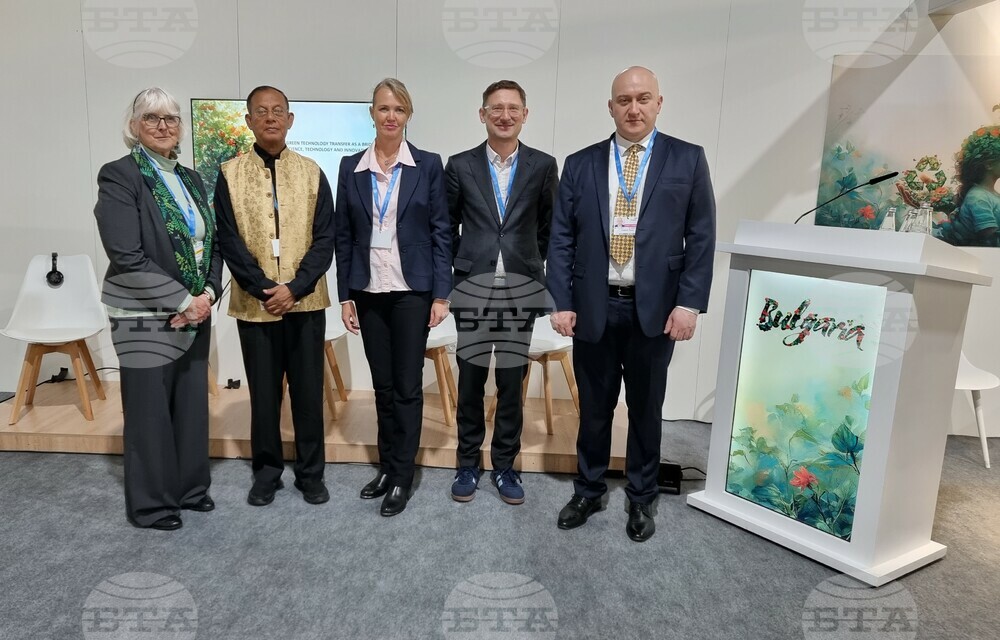site.btaChallenges of Green Technology Transfer Discussed at COP29 Bulgarian Pavilion


The challenges of green technology transfer were the focus of a discussion organized by the Innovation and Growth Ministry at the Bulgarian Pavilion at COP29 in Baku.
The development of green technology innovations and their role in the decarbonization of the economy, the adaptation and resilience to climate change, and the interest of business in green investments were discussed by Prof Mizan Khan, Technical Lead of Least Developed Countries Universities Consortium on Climate Change (LUCCC); Diane Husic, Executive Director of the Center for the Environment at St. Lawrence University; Dariusz Dybka, Business & Science Poland Principal Advisor; and Asparuh Pilosof, Member of the Sofia Tech Park Management Board, Technology Transfer and Innovation in Defence Industry. The discussion was moderated by Dotchka Vassileva, Head of the Project Information and Financing Unit at Bulgaria's Fund of Funds.
Prof Mizan Khan, who has decades of experience in climate diplomacy, said technology transfer is enshrined in both the UN Framework Convention on Climate Change and the 2015 Paris Agreement, so the political will is there. These international documents obligate the developed countries to provide finance and technology to developing countries. The latter do not need state-of-the-art technology, but technological solutions that are affordable and can be adopted by their societies.
He cited as an example the floods in Pakistan which used to claim thousands of victims. However, after the introduction of an early warning system, the number of flood casualties is much smaller than in neighbouring India, which has a much larger territory.
Bangladesh also has an early warning system, as well as a network of tens of thousands of volunteers and over 4,000 shelters to protect people from hurricanes. Another technology used in adapting to climate change is the introduction of drought-tolerant crop varieties which are helping one of the poorest countries improve its food security - its top priority since 1972, Prof Khan noted. Technology is useless unless it is integrated with human action, he said.
For her part, Diane Husic said that for decades, universities in the United States trained specialists for fossil fuel energy sectors, the oil and steel industries and metallurgy. Today, university programmes need to adapt to the new topics of pollution and green technology, and train specialists for various geographical regions. In her view, academia does not yet provide adequate training for patenting activities, for connecting young scientists and innovators with investors to help translate innovations into products and get them to the market. Various regions of the US traditionally associated with biotechnology and pharmaceutical development are moving towards decarbonization, training is needed on how to connect with investors and local communities, she said.
Asparuh Pilosof stressed the importance of interdisciplinary competence. There are few people in the world who have successful ideas that they can market and monopolize the market with them. His advice to innovators is to seek collaboration with specialists in all areas through whom an idea makes its way to the market. Ideas are free, but applying them in practice is too expensive and very difficult, he said.
Dariusz Dybka predicted that the next EU budget will earmark large funding for innovation, investment in research infrastructure and decarbonization, as Mario Draghi's report recommends. Competitiveness is a key word both in Brussels and in the whole of Europe. The future European Commission will prioritize industrialization, decarbonization and competitiveness without going to extremes. Dybka also predicted that at least 20-30% of the future EU budget will be intended for climate measures, with funds also earmarked for defence innovation.
Asparuh Pilosof stressed the importance of energy sources for the defence industry. Cheap energy is needed in this industry, whereas energy prices in Europe are rising due to the sanctions against Russia. "We cannot survive with 10% more expensive energy compared to our competitors," he said. Pilosof cited Czechia, which maintained the competitiveness of its defence industry through state intervention at a time when there was no market for its products. This preserved jobs, a highly skilled workforce and production stocks. In his view, energy is the key to success in green technology transfer.
Diane Husic stressed the need for a global conversation on climate technology and raised the issue of responsibility and decision-making for planet-wide experiments.
Prof Khan stressed the importance of public-private partnerships and the responsibility of the private sector, which is the leading polluter.
Dariusz Dybka opined that sometimes operational solutions at the local level are successful at the global level.
/DD/
news.modal.header
news.modal.text